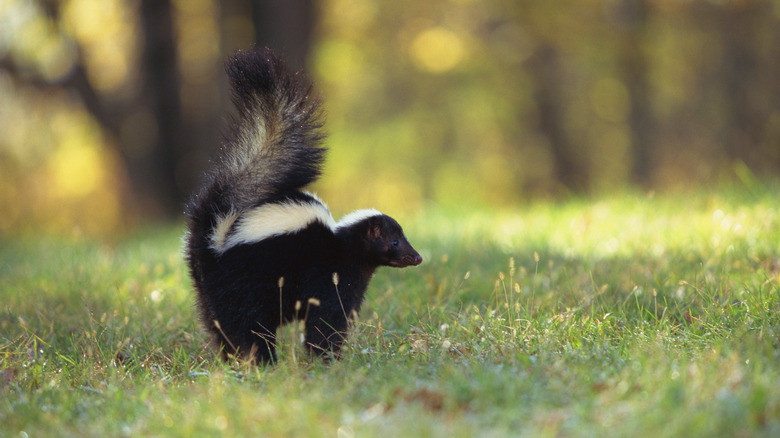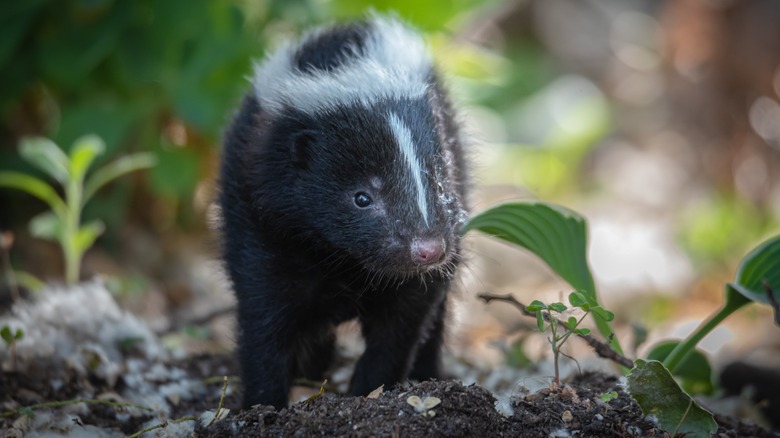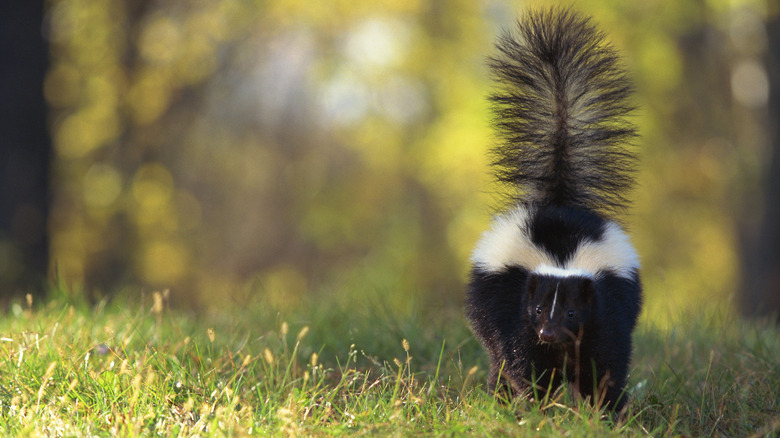Watch For These Warning Signs That A Skunk Is About To Spray
Skunks are able to spray a noxious sticky substance from their perianal glands. If it's disgusting, that's because it's supposed to be. Skunks use this spray to frighten away larger animals that might try to eat them. But what happens when a skunk mistakes you for a hungry predator?
In general, skunk spray isn't dangerous for you — it will just make you smell terrible. If it gets in your eyes, it will be extremely irritating and if you inhale it, it can seriously irritate your lungs, especially if you are already prone to asthma. If your dog is sprayed, it may make them sick and be potentially dangerous for them. Humans and dogs alike can get the oil off their fur using a mixture of hydrogen peroxide, baking soda, and dish detergent, but skunk spray is stubborn and doesn't come off easily. If you can avoid being sprayed in the first place, you will save yourself a lot of pain, irritation, and time.
Here's how to recognize when a skunk is about to spray.
They'll give you several warnings
Before a skunk sprays, it typically gives some warning signs to show you that it's upset. The skunk may hiss at you or run at you in an attempt to scare you away without deploying the spray. They may also stomp their feet angrily at you. If these fail to get the message across to you that they want to be left alone, the skunk will usually raise its tail while peering over its shoulder at you, threatening to release its repulsive spray. If you still don't leave, the skunk will likely spray.
While humans can recognize these signs that a skunk is going to spray them, dogs generally can't. In fact, according to Discover Wildcare, some believe that dogs may actually see a skunk raising its tail as a sign that it is friendly, and bound over to them the same way they would run up to sniff another dog. When the skunk sees that its warnings were ignored, it sprays, blasting the unsuspecting dog in the face. Owners have to keep an eye on interactions between their dogs and wild animals and recognize these warnings for their pets, or they may find themselves scrubbing skunk spray out of their dog's fur for hours.
It feels trapped and threatened
Even though it may be hard to believe with your eyes watering from the smell of skunk spray, skunks will do everything they can to avoid spraying you. It takes around 10 days for them to replenish their perianal glands so they can spray again, and if they waste the spray on you, they won't have it to defend themselves against predators. To decide if they're going to use their precious spray, skunks determine if a situation is threatening enough that it's worth it. You can do the same. If you just happen to spot one as you're walking home late at night, it won't come after you, but if it's trapped in an enclosed space or feels cornered by your dog, it's probably going to spray.
When there's no way for the skunk to easily escape without interacting with humans or domestic animals, it will likely spray, but if you're able to give it the chance to run away, it probably will. Unfortunately, even friendly dogs are often intrigued by skunks, and will chase after them and try to sniff them, which the skunk sees as a potential threat. To avoid this situation, Discover Wildcare suggests that you try talking as you step out of your home at night to walk your dog. If the skunk hears you, it will probably run away on its own.
Its breeding season
In late winter or early spring skunks are out trying to find a mate. Love is in the air, but, unfortunately, so is skunk spray.
During this time, males often compete with each other for the attention of female skunks, and sometimes during their fights one sprays the other. If a female skunk is not interested in a male who is pursuing her, she will spray him to make him go away. While this spray is aimed at other skunks, not you or your pets, it may make your neighborhood smell pretty bad at peak breeding season. You may also have some skunks from out of the area visiting your local skunks in hopes of finding a mate. The increased amount in the area, in particular ones who aren't familiar with you and your pets, does mean there's a greater risk of being sprayed during breeding season.



